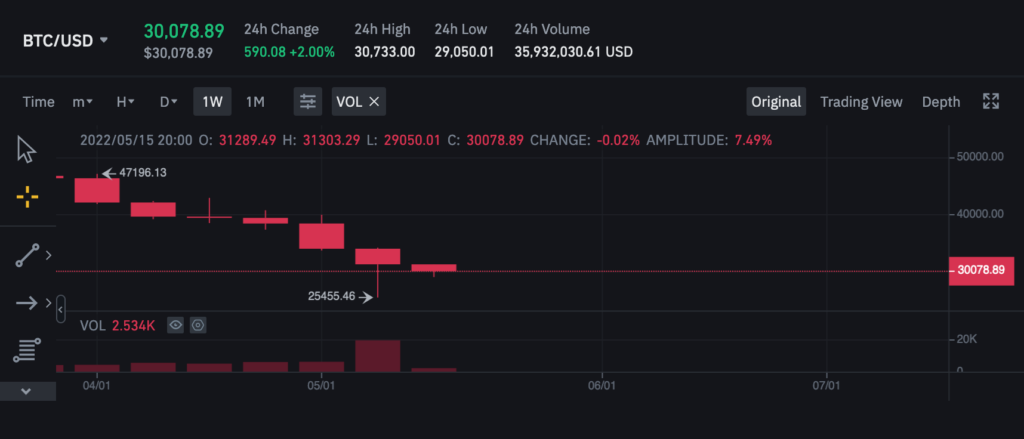By Gregory Bilecki
TWIDW 5/16/22: Terra’s reserve fund vanishes, hackers make off with $370m in April, the UK legalizes stablecoins, FASB decides to adopt accounting treatment for crypto, Amazon is giving customers in Egypt access to BNPL services, and Digital Main Street and Mastercard are fighting SMB cybercrime together in Canada. Infinity Ventures is helping fuel fintech infrastructure in a new fund, and El Salvador is flying in 44 central bank figureheads to talk Bitcoin, while Chile is halting their digital peso plans (for now).
Fed News & Market Impacts
The bloodbath continued this week as the broader market selloff worsened for the 7th straight week placing BTC below $26,000 USD on Thursday, for the first time in over 16 months, ultimately erasing $200 billion from the market. The algorithmic stablecoin Terra dropped 30 cents just one day prior on Wednesday as the USD-pegged stablecoin officially losing that status triggering the overarching selloff further. Terra’s reserve fund has since vanished with no trace.
Luna, another Terra token meant to absorb UST price shocks, erased 99% of its value and was worth just 4 cents at weak close.
If history is destined to repeat itself, I don’t feel we can expect things to change much until July.

BTC at week close, 5/15/22 – $31,289.49 BTC to USD Chart (source: Binance.US)
Fear and Greed Index as of 5/16/22: 14 (11, prior week)
Undoubtedly a catalyst for that serving of good news, hackers stole more than $370 million USD from crypto and web3 projects involving 31 hacks on record last month those of which included Beanstalk, Fei Protocol, Deus Finance, and Bored Ape Yacht Club, according to a tally by CertiK, a firm specializing in cybersecurity in the crypto space. The hacks varied in nature, from exploiting protocols to phishing users directly.
After the crash of the Terra ecosystem, the UK Treasury officially went on to legalize stablecoins. Prince Charles announced the introduction of a bill that would help tackle illicit finance, reduce economic crime and help businesses grow. However, the Treasury’s plan does not involve legalizing algorithmic stablecoins, like Terra or Tether. UK finance ministry cited the adoption of stablecoins as a means of payment as an important step. Economic secretary, John Glen, has announced that stablecoins will be brought into UK payments regulation.
The Financial Accounting Standards Board (FASB), the body responsible for setting accounting and financial reporting standards for companies in the United States, has turned its attention to digital currencies.

The body said it reached its decision due to the digital currency industry’s growing need for clarity. It has been getting a lot of feedback from industry players who point out that accounting and financial disclosure standards are urgently needed for the public’s interest, especially as the market cap of digital currencies has grown rapidly. Currently, companies cannot mark up gains in their holdings unless they sell the assets, but have to report impairment losses when the assets fall below their purchase price. The FASB has stated that it will consider adopting fair value accounting for digital currencies, similarly to how stock sales and most other investments are now treated.
The Payment Space
Amazon is giving customers in Egypt access to buy now, pay later (BNPL) thanks to a consumer financing offering from valU Consumer Finance. According to multiple media accounts, valU will offer the payment method on amazon.eg to eligible customers, who will gain the option to divide their cost into multiple payments. As part of the agreement, Amazon will acquire $10 million in the global depositary receipts of EFG Hermes, the investment bank that owns valU. The deal gives Amazon the option to replace that investment into valU at a later date, which comes out to a stake of 4.255% of the issued share capital of valU.
Digital Main Street and Mastercard will expand their partnership with an eye toward giving more resources to help Canadian businesses fight cybercrime, which has only increased since the beginning of the pandemic. The expansion will bring educational programs and boost cybersecurity awareness for small-to-medium sized businesses (SMB’s). It will also offer new tools to help SMBs examine their cyber readiness and provide recommendations to tighten risk mitigation. Small business owners will now be able to access various tools to fight back against the cybercrime with the partnership expansion with Mastercard.
Deals and Capital Raises
Early-stage venture capital firm Infinity Ventures is launching its inaugural $158 million USD fund to help fuel fintech infrastructure, commerce enablement and other startups that align with its model and portfolio. Their model helps take the risk out of execution by applying the operation and investment experience it has culminated over the decades. That experience has helped startups scale, and also supported product development and market strategies for firms. Infinity Ventures has so far funded 11 companies that have developed solutions to address some of the major challenges facing financial infrastructure – access, utility, flexibility, and cost.
New York-based Computecoin announced they have secured $6.2 million USD in strategic funds in a round led by Aves Lair. Their network powers all-purpose Web3 and metaverse applications by providing low-cost, low-latency, decentralized storage and computing for artificial intelligence, machine learning, big data analytics, and similarly resource-intensive computing applications. It does so through aggregating decentralized clouds (e.g. Ethereum, Filecoin, Swarm) offloading computer-intensive tasks like 3D rendering and motion-capturing data processing to a proximity network supplementing compute power. In addition, Computecoin provides Web 2.0-compatible APIs and developer tools for Web 2.0 developers to seamlessly migrate to web3.
The CBDC Experiment
El Salvador President Nayib Bukele said over this past weekend that 32 central banks and 12 financial institutions will meet in his country this week to talk about a series of topics involving cryptocurrencies, particularly Bitcoin. Discussions will pertain to financial inclusion, digital economy, banking the unbanked, Bukele mentioned on Twitter. Most of the central banks and financial institutions invited come from third-world nations, including those in Paraguay, Ghana, Uganda, Jordan, Gambia, Egypt and Armenia.
Banco Central de Chile (BCC), Chile’s central bank, has been weighing the prospects of issuing a central bank digital currency but it has not been able to finalize a decision on the matter. In a recently published report, the BCC continued to dissect the country’s payment system to see where a digital peso would fit in. It maintains that the Chilean financial system met all the payment needs of the country and is resilient to challenges at present, but also agrees that a CBDC will help drive competition, innovation, and greater financial inclusion in the country. It adds that a CBDC will keep residents of the country from flocking to highly risky digital currencies which it had repeatedly warned investors about.
Gregory Bilecki is a freelance editor at Digital Wealth News, as well as full-time finance, digital marketing, and sushi aficionado. Follow him on Twitter and Instagram at @omgreaktmedia.





